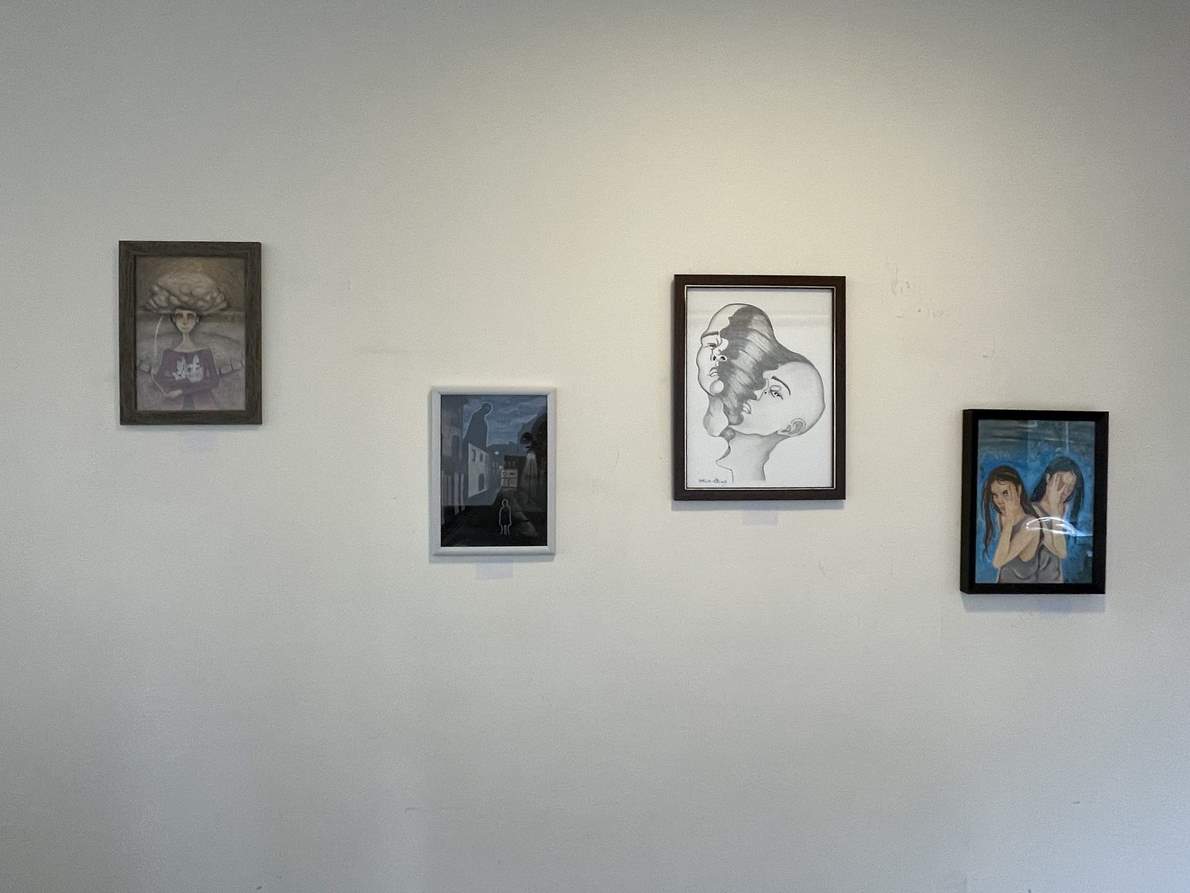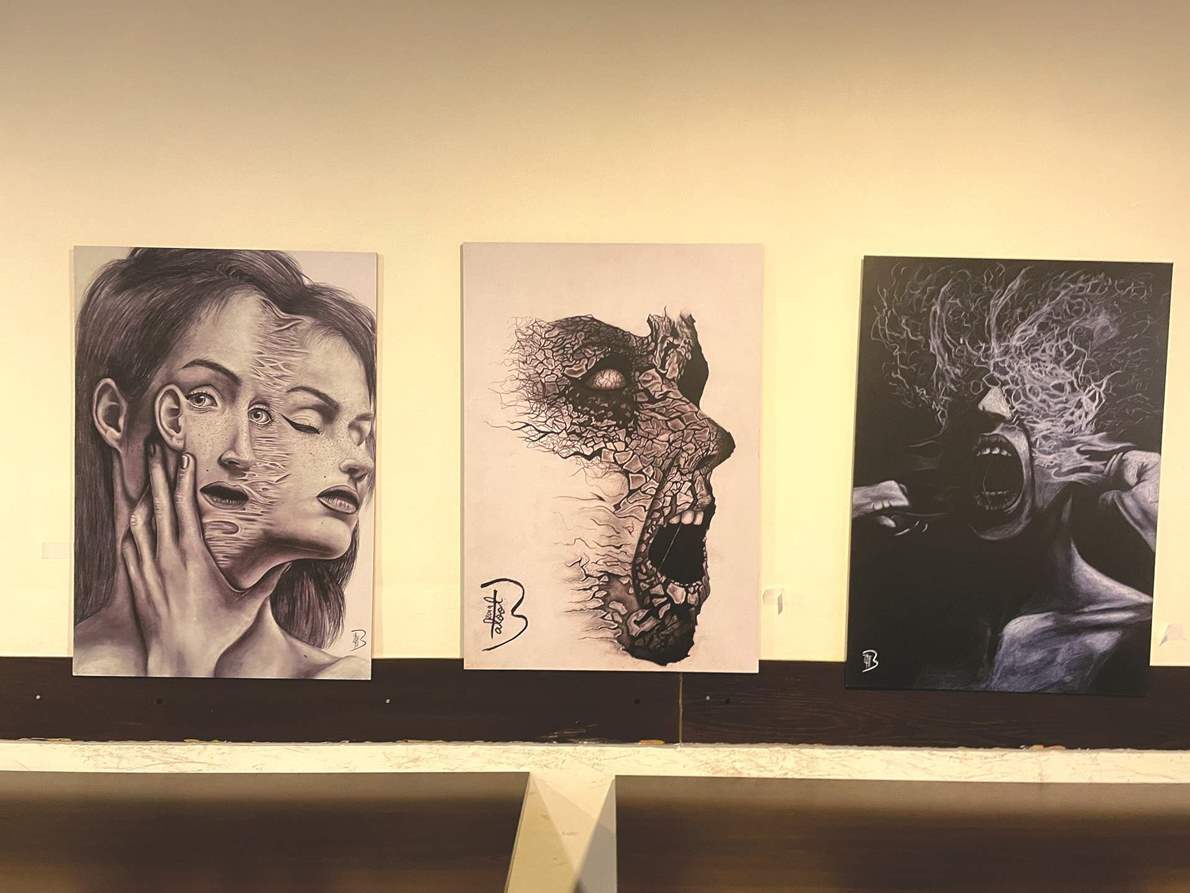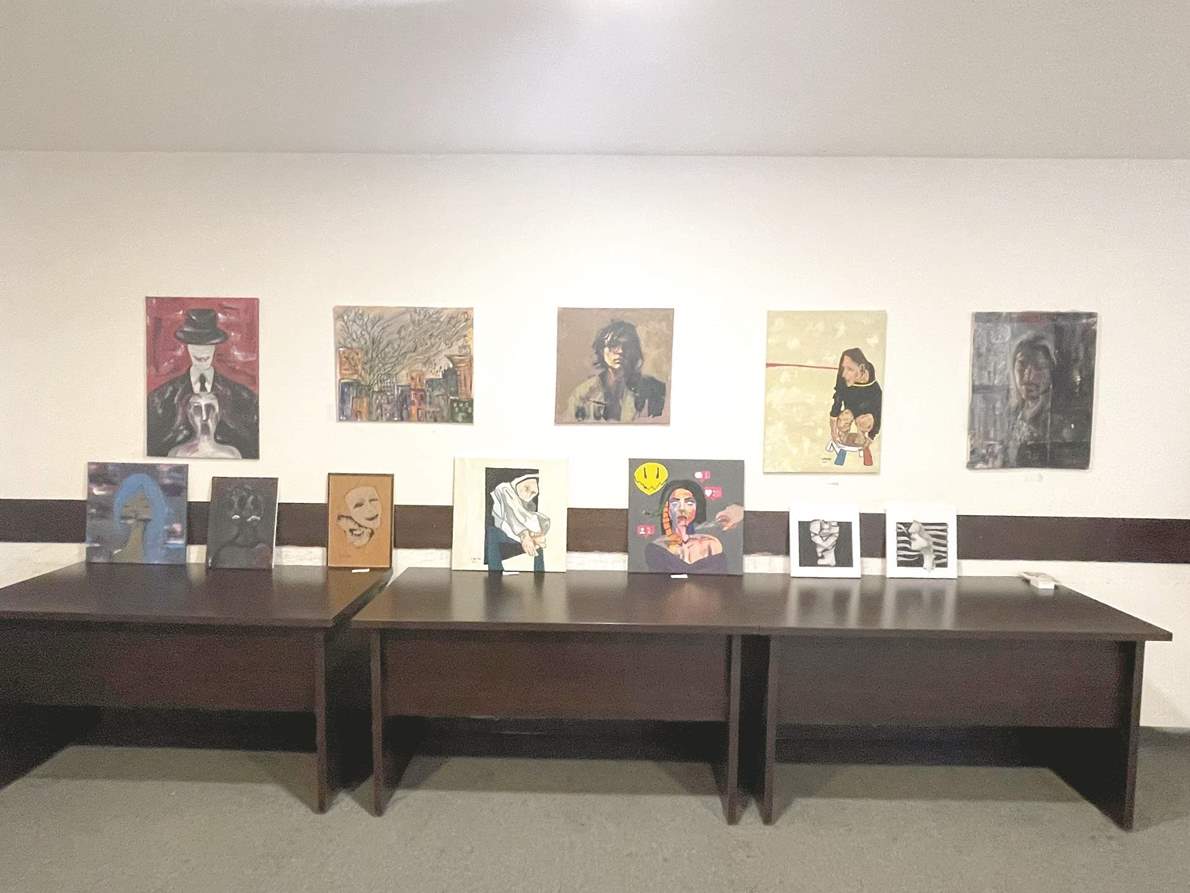AMMAN — On Saturday, Circle of Hope, a youth-led initiative,
launched the third edition of their guide to psychological services in Jordan at
Chemisty for Training and Consultancy.
اضافة اعلان
The guide includes tips on what mental health patients should do before,
during, and after receiving psychological therapy, as well as the names and
contact information of places that provide psychological services in Jordan.
During an event marking the launch, Atef Al-Qasem, head of the
Psychological Sciences Association, delivered a lecture titled, “COVID-19 and
Mental Health”.
 Artwork displayed at Chemisty for Training and Consultancy
during the launch of Circle of Hope’s guide to mental health services in Jordan.
(Photos: Raghad Zayed/JNews)
Artwork displayed at Chemisty for Training and Consultancy
during the launch of Circle of Hope’s guide to mental health services in Jordan.
(Photos: Raghad Zayed/JNews)
Discussing mental health policy in the context of the COVID-19
pandemic,
Qasem stated, “Instead of assuring the public, which is considered the first
element of psychological first aid, those at the forefront of curtailing the
pandemic exchanged contradictory arguments.”
“The pandemic created a state of confusion and panic.
People had
different reactions, some of them experienced psychological anxiety, while
others became depressed or had panic attacks,” Al-Qasem said.
The head of the association contended that due to the pandemic in 2020,
people were forced to reprioritize their needs by placing safety above
psychological health.
Jordan also witnessed a rise in Generalized Anxiety Disorder cases, said
Qasem.
“People became concerned about income, work, and the education of their
children,” he said.
 Artwork displayed at Chemisty for Training and Consultancy
during the launch of Circle of Hope’s guide to mental health services in Jordan.
(Photos: Raghad Zayed/JNews)
Artwork displayed at Chemisty for Training and Consultancy
during the launch of Circle of Hope’s guide to mental health services in Jordan.
(Photos: Raghad Zayed/JNews)
Qasem explained that during government-imposed quarantine, people
expressed themselves in different ways.
“Some people did so by reading,
exercising, or creating entertaining games while others resorted to sexual
violence, murder, and divorce.”
“On the social-psychological level, coping problems have emerged including
boredom, sleep addiction, and social fears … as well as eating disorders,
social crimes, and domestic violence,” he said.
He pointed out that people were “overwhelmed” by technology as they used
it to satisfy their social needs.
This affected their social communication
skills negatively.
At the end of the lecture, Qasem suggested that the Ministry of Health
needs to create psychological clinics that provide “COVID-19 victims” with
psychological support and therapy.
He also proposed improving psychological counseling at schools to
mitigate the “negative impact” the pandemic has had on students.
 Artwork displayed at Chemisty for Training and Consultancy
during the launch of Circle of Hope’s guide to mental health services in Jordan.
(Photos: Raghad Zayed/JNews)
Artwork displayed at Chemisty for Training and Consultancy
during the launch of Circle of Hope’s guide to mental health services in Jordan.
(Photos: Raghad Zayed/JNews)
“I believe that the role of psychological counsellors and therapists in
the coming period will be more important than that of teachers,” he said.
Qasem called for paying more attention to psychological issues in the media
and raising awareness about psychological issues.
Addressing the audience at the event, Laith Odeh, director of Al-Safsaf
Center/The Jordanian Psychiatric Rehabilitation Society, said that people
should look at mental health patients from a different angle to see them as they
truly are: “beautiful minds”.
Odeh said that people usually avoid those who have mental illnesses,
feel socially ashamed of them, and ask them to change.
“People ask mental health patients to be ‘normal’, and I use quotations
because I do not know what ‘normal’ could mean to them,” he said.
Odeh cited a study conducted by the Ministry of Health in 2019, which
revealed that 25 percent of Jordanians have psychological problems.
Another study conducted by University of Petra measured the impact
COVID-19 has had on mental health in Jordan.
The study found that after the
pandemic, some 65 percent of Jordan’s population suffers from psychological
problems.
Odeh said in an interview with
Jordan News that stereotyping has
“horribly affected” seeking psychological therapy in Jordan.
“Stereotyping makes people think a million times before going to
therapy, and even if they go, they are always hesitant and are likely to quit given
their fears of the community,” he added.
Rula Bazadog, human engineering and digital humanities specialist and
CEO of the Jordanian Fund for Happiness and Life Development, also spoke at the
event on Saturday.
Bazadog introduced human engineering and digital humanities
in theory and practice, their relationship with artificial intelligence (AI),
and their impact on the psychological health of individuals, society, and the country.
The specialist discussed the world’s latest discoveries in AI and how it
has affected people’s lives and mental health.
At the end of the event, Assel Nassar, meditation and mindfulness coach
at World Peace Initiative, held a 15-minute meditation session.
During the session, the audience was briefed on the importance of mental
exercises and how to apply such exercises to their daily life activities.
“Just like exercising at the gym to enhance physical fitness, meditation
is one of the tools that helps people reduce stress, whether they are aware of
it or not,” Nassar said.
The most popular mental exercises are breathing, meditation,
mindfulness, and gratefulness exercises, according to Nassar.
Renad Al-Qurani, founder of Circle of Hope, told
Jordan News that
the launched guide aims at providing access to mental health services in
Jordan.
“The goal is to provide all psychological services under a single
umbrella … These services include psychological organizations and websites,
therapists, psychiatrists, among others, and can be accessed by anyone for
free,” she said.
According to Qurani, since the launch of Circle of Hope in 2019, the
initiative has been working to raise awareness about mental health, build a
supportive community, reduce social stigma, and provide people with access to
psychological services in Jordan.
An art gallery was also organized for the event to present paintings,
portraits, and sketches about mental health problems, social stigma, and other
related topics.
Read more
Lifestyle



